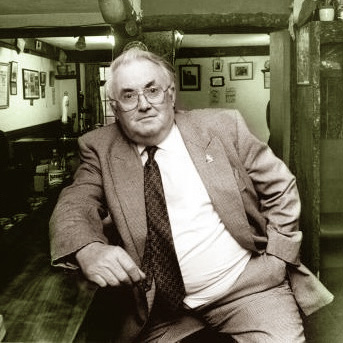Timmy “the Brit” McCarthy (1945-2018) was born and grew up in London but his Irish parents maintained strong ties to their native Cork. Though he was enrolled in step dancing lessons as a youngster, he wasn’t especially inspired by the tradition. “My grandfather Timmy Roche, who I’m named after, was a champion All-Ireland step dancer, in 1922 I think, with a dance called The Blackbird,” recalled Timmy. “My mother insisted that I do step dancing, and to be honest I hated it because you used to have to wear [a kilt which] I thought was a dress.” After his parents’ death at a young age, he was raised in Catholic orphanages which he remembered with some fondness as an adult.
After a short stint in the R.A.F., he moved to Cork in the 1960s to work as a butcher (where his London accent earned him his life-long nickname). There he was surprised to find less traditional and folk music being played than there had been in London when he left. In Cork city, the scene was only just beginning to shift from the showbands playing American and British pop music to the folk revival that would soon sweep the nation, and Timmy was determined to urge the change along. He stumbled upon a folk club organized by Jimmy Crowley, and when that came to an end, Timmy organized a folk club of his own in the Cork city suburb of Douglas. Through his determination and enthusiasm this would eventually morph into the beginnings of the Cork Folk Festival, still going strong today. In the course of looking for folk acts to perform at the festival, he found himself one day hunting down Johnny O’Leary and Mikey Duggan at Dan O’Connell’s pub in Knocknagree. There, he later recalled, “a woman called Eily Buckley saw me sitting down and she took me up and threw me round the floor. I didn’t know what the hell had happened to me, but that was the Sliabh Luachra set, and it changed my life.” The scene at Knocknagree was worlds away from his dance lessons as a boy in London. “I thought it was gobsmackingly beautiful, because I’d never seen a set before that was so inclusive,” he later said. “There was no age left out. It was teenagers up to octogenarians.”
He soon became a regular at Dan O’Connell’s, and found himself assuming the role of pupil and disciple to the man of the house. O’Connell was a tireless cheerleader for the Sliabh Luachra traditions, and infected McCarthy with his enthusiasm. “Dan O’Connell’s philosophy, I’ve inherited. He had a very simple way: Stay behind the people in front of you; in front of the people behind you; opposite the people opposite you, and you do it on bloody time. That means that if you’ve an old couple in front of you and the book says you have to get back militarily to the geographical place you started off, you don’t push them out of the way, you dance according to their comfort zone. I think that philosophy was wonderful.”
Inspired to immerse himself in the tradition, he moved to Baile Mhúirne where the music and dancing was a large part of local life. There, in addition to the Sliabh Luachra set and the Ginnie Ling, Timmy sought out less widely known local set dances such as the Black Valley Square Jig, the Coolea Jig, the Borlin Valley Polka Set, the Tuosist Set, and the Mealagh Valley Jig Set. At that time some of these were not danced very often, and some not at all, having fallen out of fashion. In an effort to rescue them from obscurity, he took it upon himself to start teaching, and even picked up the accordion so that he would never lack for a musician (considering taped music unacceptable). “I never set out to teach set dancing but people asked me to teach. I had a passion for the music of Sliabh Luachra, Corca Dhuibhne, Múscraí, and the dances that went with it. I set out to connect and re-teach all those old sets that were dead in the villages where they were, and have people dancing their own sets. People would ask me to teach them sets, so I used to make a deal that each week they were to go to the people that had the local set, learn it, or bring the people up to teach it to me, and I’d teach it back into the local community. We saved an awful lot of sets that way.”
He was to take these local dances all over the world, traveling far and wide to teach the sets he loved so dearly. Soon before his passing in 2018 a concert was organized in his honor, with countless luminaries of the tradition attending to pay tribute to the man who had done so much to preserve and spread the culture of the Cork-Kerry border. Timmy exclaimed, “I’m just overwhelmed. I don’t deserve it, but what a compliment. I’ve had a fabulous life and this is an amazing, gobsmacking tribute… that’s all I can say. When I see the line-up for that concert… people know me as Timmy the Brit, but they were the people that made me feel I’m home, I’m Irish.”
Some photos and text borrowed from The Irish Examiner






A lovely program from Radio 1 called “Timmy the Brit Comes Home”:
Another profile of Timmy:











